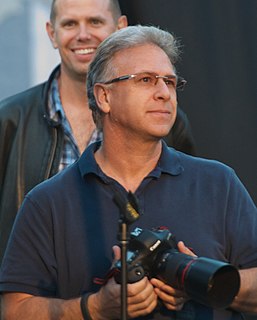A Quote by Mark Zuckerberg
I actually don't read most of the coverage about Facebook. I try to learn from getting input from people who use our services directly more than from pundits.
Related Quotes
We live in a society of social networks, with Twitter pages and Facebook, and that’s fine, but we have contact with our work associates, our family, our friends, and it seems like half the time we are more preoccupied with our phone and other things going on instead of the actual relationships that we have right in front of us. Hopefully, people can learn from this and try to actually help if someone is battling something deeper on the inside than what they are revealing on a day-to-day basis.
The Olympic Games are for 'the youth of the world,' but they're organized and scored by countries. It's no surprise that countries treat them as vehicles of national pride, and assume that their people will be most interested in their own athletes. So anybody who was saving up to write an angry letter, blog post, or op-ed about NBC's chauvinistic coverage: don't bother! They're actually more above-the-fray than most. Also, their coverage is not shown anywhere except America - I know, it's because I can't get it that I'm watching Women's Air Pistol - so can't ruffle feathers elsewhere.
The manual for WordStar, the most popular word-processing program, is 400 pages thick. To write a novel, you have to read a novel - one that reads like a mystery to most people. They're not going to learn slash q-z any more than they're going to learn Morse code. That is what Macintosh is all about.
One of their major initiatives was getting all officers on Facebook. So the question is, why are these people who are there to train the Afghans being pressured to be on Facebook? Again, it sounds benign until you realize that the military's concern isn't the Afghans, it's convincing the American people that we should be in Afghanistan.Soldiers can put up pictures and say "See how happy the Afghans are because of our presence here." It's a way to directly influence the American people using propaganda.
When you learn to read and write, it opens up opportunities for you to learn so many other things. When you learn to read, you can then read to learn. And it's the same thing with coding. If you learn to code, you can code to learn. Now some of the things you can learn are sort of obvious. You learn more about how computers work.
I haven't sworn off Facebook. I'm on Facebook. There's a fan page on Facebook that I will update, but I'm on there myself under a pseudonym, because there were a lot of people able to private-message me on Facebook, and it was getting really weird. And then with MySpace, I just don't read messages. I delete everything, and I just post updates every now and then.
So to the best we can, what we do is focus on creating value for others, and how do we do that? We do it by trying to produce products and services that our customers will value more than their alternatives, and not just their alternatives today, but what the alternatives will be in the future. We try to more efficiently use resources than our competitors, and constantly improve in that, and we try to do the best job we can in creating a safe environment, and environmental excellence, and constantly improve at that.



































